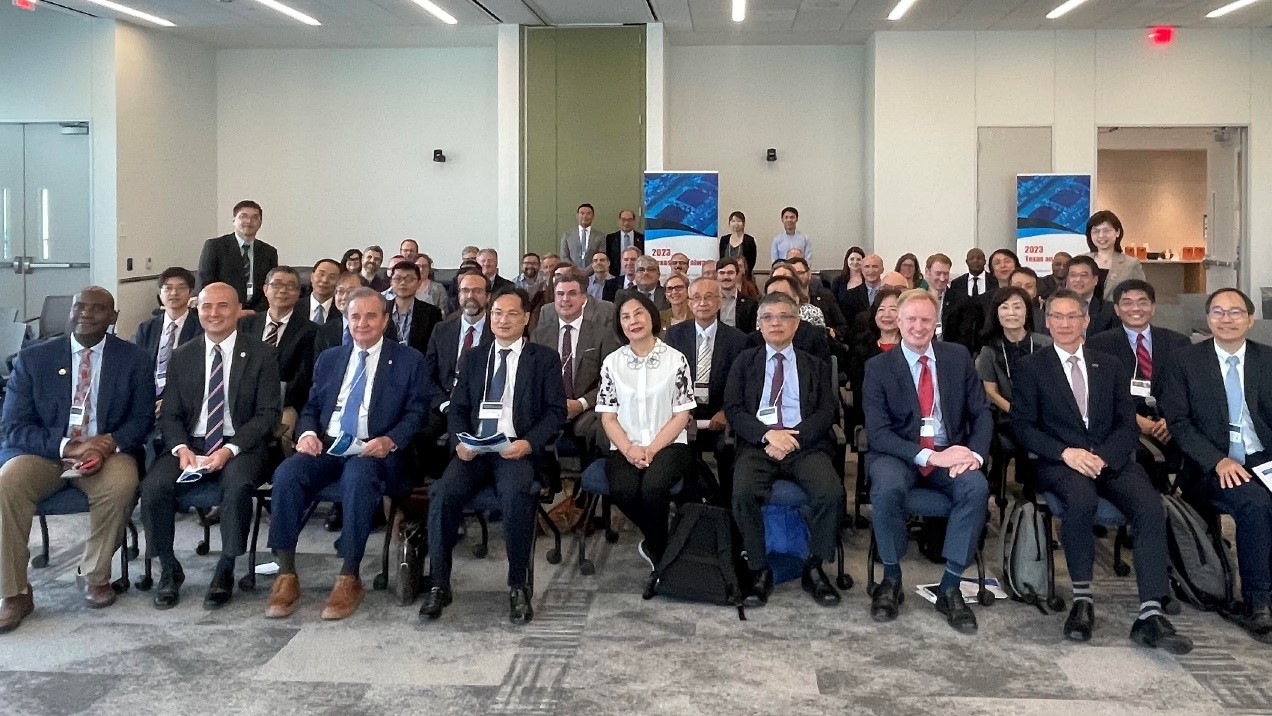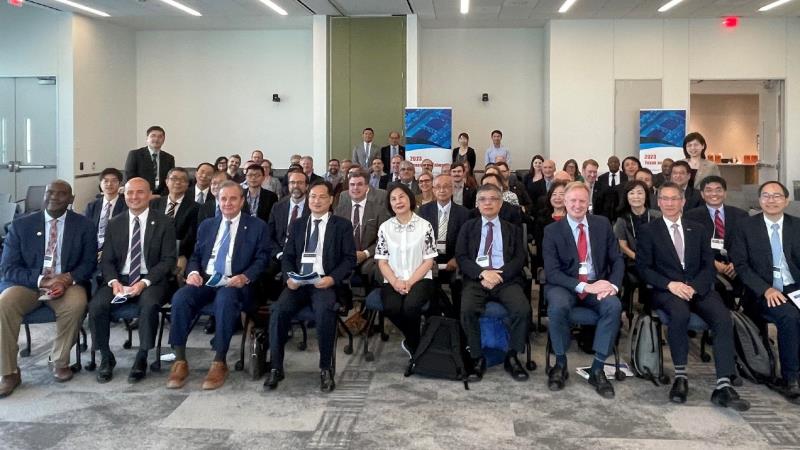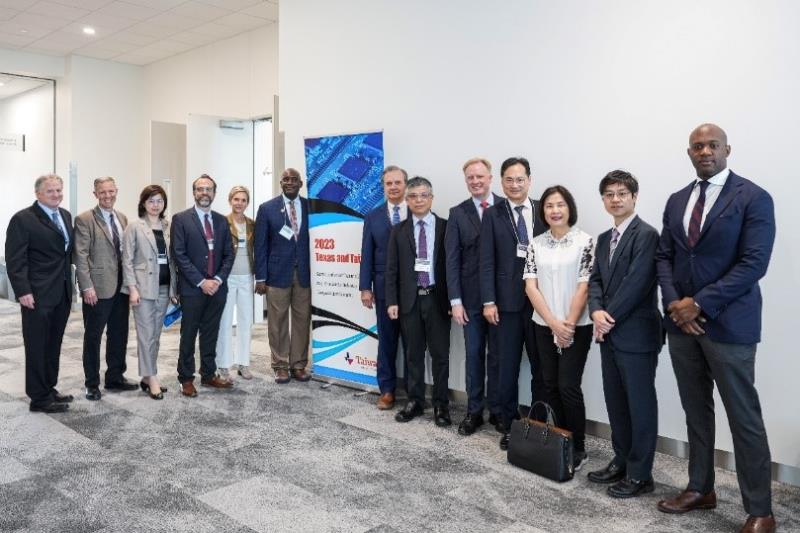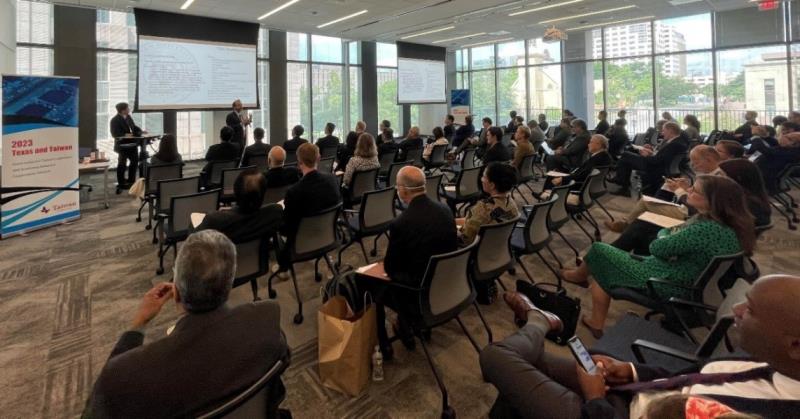International Cooperation Discussed at Taiwan–Texas Semiconductor Summit in Austin

A summit in Austin on June 2, 2023 brought together people from 18 universities in Texas and six universities in Taiwan: National Taiwan University, National Yang Ming Chiao Tung University, National Cheng Kung University, National Tsing Hua University, National Sun Yat-sen University, and National Taipei University of Technology. These universities, which constitute the University Academic Alliance in Taiwan, all offer training and research programs in the field of semiconductors and related technology.
The summit was organized by the Taipei Economic and Cultural Office in Houston and the Texas Higher Education Coordinating Board to give Deputy Minister of Education, Dr. Mon-Chi Lio and representatives of the six universities in Taiwan an opportunity to meet with Texas state leaders, officials, professors and researchers from 18 universities across Texas, and leaders of the 5-university Texas Tech University System, the 9-university University of Texas System, and the 11-university Texas A&M University System.
The goal was to discuss possibilities to establish exchanges and collaboration between these universities in Taiwan and universities in several Texas university systems, to train highly skilled professionals for the semiconductor industry and related technologies, and engage in academia-industry cooperation.
The summit was an expression of the continuing and evolving synergy between Texas and Taiwan in semiconductor and technology fields. Taiwan has been working with the United States on several new projects since the launch of the U.S.-Taiwan Education Initiative in December 2020, and this summit reflects the policy goals laid out by the most recent three-year strategic plan for further cooperation in language education and other areas that was launched in March this year. These include creating academic alliances between universities in Taiwan and the U.S. in a wide range of fields—including agriculture, life sciences, social sciences, humanities and the arts, health sciences and medicine, science, and engineering—with a particular focus on finance, international communication, and the training of highly-skilled professionals in the semiconductor field.
The summit began with opening remarks from the following education officials: Dr. Harrison Keller, Commissioner of Higher Education for the State of Texas and chief executive officer for the Texas Higher Education Coordinating Board, Chancellor John Sharp of the Texas A&M University System; Prof. Archie Holmes, Executive Vice Chancellor for Academic Affairs of the University of Texas System; Dr. Mon-Chi Lio, Deputy Minister of Education; Robert Lo, Director-General of TECO in Houston; Jacey Jetton, State Representative and Co-Chairman of the Taiwan-Texas Friendship Caucus; and State Representative Angie Chen Button (virtually).
Director-General Lo spoke about how semiconductors are vital, not just to Taiwan but to Texas, the United States, and the whole world. He said that Texas can be sure that partnerships with Taiwan are secure because Taiwan and the U.S. share democratic values. Deputy Minister Lio emphasized the importance of establishing streamlined communication between Taiwan’s Academic Alliance and Texas’ university systems to foster deeper, pragmatic collaboration. Dr. Keller spoke about the importance of different educational institutions of higher education in Texas strengthening their partnerships with industry. Chancellor Sharp welcomed partnerships between universities in Texas and Taiwan. He also voiced support for Taiwan on the international stage and as a solid choice for collaboration in the semiconductor field and other fields.
Dr. Huey-Jen Jenny Su introduced each of the University Academic Alliance in Taiwan universities participating in the summit and then spoke about Taiwan’s world-renowned semiconductor industry. She credited Taiwan’s success in the semiconductor industry, in part, to Taiwan’s science and technology parks and clusters, to robust public-private partnerships, and to the strong academia-industry cooperation that is essential for high quality talent cultivation.
Prof. W. John Kao, president of National Tsing Hua University; Prof. Ding Shih-Torng, Executive Vice President of National Taiwan University; Prof. Wei Shun-Hua, Senior Vice President of National Yang Ming Chiao Tung University; Prof. Kuo Chih-Wen, Senior Vice President for International Affairs at National Sun Yat-sen University; Prof. Yang Shih-Hsuan, Vice President of National Taipei University of Technology (Taipei Tech); and Prof. Chiang Meng-Hsueh, Vice Dean of the College of Electrical Engineering and Computer Science at National Cheng Kung University gave presentations outlining the programs and courses on semiconductors and similar technologies offered by their respective universities.
The University of Texas system representatives talked about the proposed Texas Institute for Electronics, which would be a public-private alliance between many universities and companies in the semiconductor sector. And the Texas A&M University System, the University of Texas at Dallas, and Rice University showcased developments in their semiconductor-related research and programs.
The universities from Taiwan and the participating university systems from Texas agreed that: 1. the initial focus of collaboration will be the fields of semiconductors, quantum technology, agriculture, biomedical engineering, space technology, and Mandarin Chinese language learning; and 2. an online working meeting will be held soon to discuss matters further, including the possibility of a collective MOU being signed between the University Academic Alliance in Taiwan and university systems in Texas. It was suggested that representatives of the Texas A&M University System and of the UT system could travel to Taiwan to become better acquainted with the universities there and possibly sign the proposed collective MOU.
The summit demonstrated the strong interest in and enthusiasm for science and technology education collaboration between Taiwan and Texas. This is exciting and significant and provides a strong foundation for further strengthening academic exchanges between us, and joint investment of resources.



